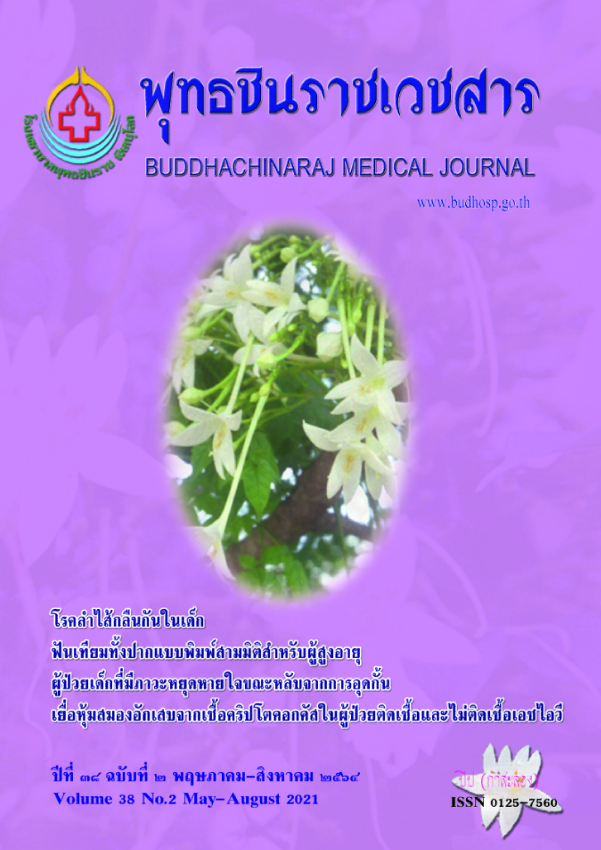ปัจจัยที่สัมพันธ์กับพฤติกรรมการควบคุมความดันโลหิตของผู้ป่วยโรคความดันโลหิตสูง
การควบคุมความดันโลหิตของผู้ป่วยโรคความดันโลหิตสูง
คำสำคัญ:
ปัจจัย, การควบคุมความดันโลหิต, พฤติกรรม, โรคความดันโลหิตสูงบทคัดย่อ
โรคความดันโลหิตสูงเป็นโรคเรื้อรังที่มีจำนวนผู้ป่วยเพิ่มขึ้น หากควบคุมระดับความดันโลหิตไม่ได้เป็นระยะเวลานานจะส่งผลให้เกิดภาวะแทรกซ้อนซึ่งนำมาสู่ความพิการและเสียชีวิตได้ การสำรวจครั้งนี้มีวัตถุประสงค์เพื่อประเมินปัจจัยที่สัมพันธ์กับพฤติกรรมการควบคุมความดันโลหิตของผู้ ป่วยโรคความดันโลหิตสูงที่มารับการรักษาที่แผนกผู้ป่วยนอก โรงพยาบาลบ้านไร่ จังหวัดอุทัยธานี โดยให้ผู้ป่วยโรคความดันโลหิตสูง 151 คน ตอบแบบสอบถามซึ่งประกอบด้วยอายุ ระดับการศึกษา รายได้ของครอบครัว ดัชนีมวลกาย ระยะเวลาที่เป็นโรค การรับรู้ต่อโรค ความดันโลหิตสูง การรับรู้การสนับสนุนของครอบครัว การรับรู้ความสมรรถนะตนเอง และพฤติกรรมควบคุมความดันโลหิต นำเสนอข้อมูลด้วยจำนวน ค่าร้อยละ ค่าเฉลี่ย ค่าเบี่ยงเบนมาตรฐาน และหาค่าสัมประสิทธิ์สหสัมพันธ์สเพียร์แมน ผลการวิจัยพบว่าระดับการศึกษามีความสัมพันธ์ทางบวกกับพฤติกรรมควบคุมความดันโลหิต (r = 0.179, p = 0.028), รายได้ของครอบครัวมีความสัมพันธ์ทางลบกับพฤติกรรมควบคุมความดันโลหิตของผู้ป่วย (r = -0.171, p = 0.036) การรับรู้ต่อโรคและการรับรู้สมรรถนะตนเองมีความสัมพันธ์ทางบวกกับพฤติกรรมควบคุมความดันโลหิต (r = 0.355, p < 0.001 และ r = 0.298, p < 0.001ตามลำดับ) ดังนั้น ควรส่งเสริมความรู้ในกลุ่มที่มีระดับการศึกษาน้อยและควรมีกระบวนการส่งเสริมให้ผู้ป่วยโรคความดันโลหิตสูงได้รับรู้เกี่ยวกับโรคและการรับรู้สมรรถนะตนเองในการวางแผนส่งเสริมและปรับเปลี่ยนพฤติกรรมสุขภาพให้สามารถควบคุมความดันโลหิตได้
เอกสารอ้างอิง
2. World Health Organization. Hypertension:symptoms. Hypertension has the problem [Internet]. 2020 [cited 2020 Jan 20]. Available from URL: https://www.who.int/health-topics/hypertension/
3. Wattanachai J, Palungrit S, Tiyoa N, Aninalabon W, Boonnak P, Makpirom J. Self-care behaviors of village health volunteers to prevent diseases and complications due to hypertension. J Nurs Health Care 2021;39(1):108-17. (in Thai)
4. Jaiyungyean J, Voraroon S. Relationships among percieved self-efficacy, family support and health promoting behaviors of plder people with hypertension. JN Siam 2016;17(33):20-30. (in Thai)
5. Tudsri P, Nakkling Y. Health promotion behaviors of person with hypertension: comparison between controlled and uncontrolled blood pressure. CJTCN 2018;6(1):27-35. (in Thai)
6. Panthonglang W, Namphonkrang P, Duangsanjan W. Factors Influencing the health behavior of uncontrolled hypertension patients. Songklanagarind J Nurs 2018;38(4):152-65. (in Thai)
7. Bandura A. Self-efficacy: the exercise of control. New York City, New York State, USA: W.H. Freeman; 1997.
8. Hu H, Li G, Arao T. Validation of a Chinese version of the self-efficacy for managing chronic disease 6-item scale in patients with hypertension in primary care. ISRN Public Health 2013:6. Available from URL: http://dx.doi.org/10.1155/ 2013/298986
9. National Health Development Plan Administration Committee. National Health Plan 12th (B.E. 2560-2564) [Internet]. 2016 [cited 2020 Jun 2]. Available from URL: https://bps.moph.go.th/new_bps/sites/default/files/HealthPlan12_ 2560_2564.pdf
10. Khorsandi M, Fekrizadeh Z, Roozbahani N. Investigation of the effect of education based on the health belief model on the adoption of hypertension-controlling behaviors in the elderly. Clin Interv Aging 2017;12:233-40. doi:10.2147/CIA.S117142
11. Banrai Hospital. Patients registration of medical record in hypertension service between 2016-2020. Uthaitani, Thailand:Banrai Hospital; 2020.
12. Polit DF, Hungler BP. Essentials of nursing research: methods, appraisal, and utilization. Philadelphia, Pennsylvania State, USA:Lippincott; 1997.
13. Mukaka MM. Statistics corner: a guide to appropriate use of correlation coefficient in medical research. Malawi Med J 2012;24(3):69-71.
14. Laloon P, Madhyamankura N, Malarat A. Selfcare behavior of hypertensive patients at Outpatient Department of HRH Princess Maha Chakri Sirindhorn Medical Center. J Med Health Sci 2011;18(3):160-69.
15. Sujumnonk S, Therawiwat M, Imamee N. Factors related to self-management of hypertensive patients, Taladkwan Distric Health Promoting Hospital, Nonthaburi Province. JBCNB 2013; 29(2):20-30. (in Thai)
16. Seetisarn P, Suwannarat A, Jailungkar J. Factors associated with self-care behaviors among uncontrolled hypertension patients in Dokkhumtai Hospital, Dokkhumtai District, Prayao Province. LPHJ 2013;9(2):120-36.(in Thai)
17. Becker MH. The health belief model and personal health hehavior. Health Educ Monogr 1974;2:324-508. http://dx.doi.org/10.1177/109019817400200407
18. Plianbumroong D. Health perception and health behaviors of pre-hypertension client. JNHC 2016;34(1):83-92. (in Thai)
19. Markmee Ph, Kantawee Ph, Suthana W, Saleeon Th. An investigation of factors relationship with self-care behaviors in elderly patients with hypertension in Doi-Louang District, Chaing-rai Province. JHEd 2019;42(2):87-98. (in Thai)
20. Panthonglang W, Namphonkrang P, Duangsanjan W. Factors influencing the health behavior of uncontrolled hypertension patients. Songklanagaring J Nurs 2018;38(4):152-65. (in Thai)
21. Turongruang S, Wattana Ch, Harnirattisai T, Liangchawengwong S. Effects of a selfefficacy promoting program on disease control behaviors and disease control among patients with uncontrolled hypertension. Nurs J 2017;44(Suppl 1):69-82. (in Thai)






